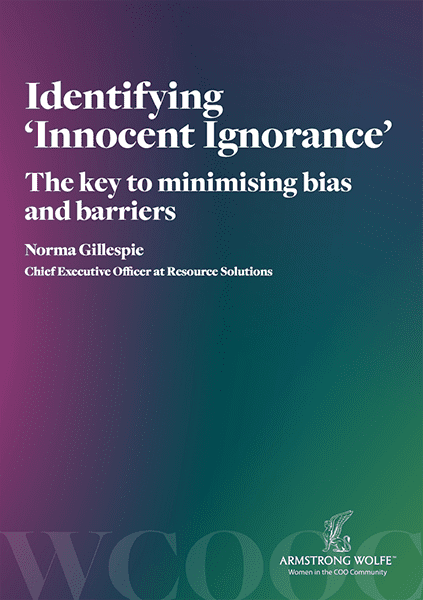The key to minimising bias and barriers
Norma Gillespie
Chief Executive Officer at Resource Solutions
Equity, diversity and inclusion has been high on the agenda for many years and is now widely considered a business imperative, yet female representation in financial services remains lower than other industries and the recent growth in female representation is stagnating.
It’s not enough to focus just on inclusion, organisations need to audit and re-engineer their recruitment processes, argues Norma Gillespie, Chief Executive Officer at Resource Solutions.
Unconscious bias (the associations we hold, outside our conscious awareness and control) is a well-known and often debated topic, yet it is ‘Innocent ignorance’ that I believe has the most direct impact on the hiring decisions that are made on a day-to-day basis. The founding principle of ‘innocent ignorance’ is that we simply don’t know what we don’t know and this can result in hidden barriers for women.
Many of the legacy processes and approaches in recruitment are still used today because they have largely worked in the past and, perhaps, a “we’ve always done it that way” mindset. However, many of these processes, whether it is asking current salary or using unvalidated assessments, can perpetuate bias and disadvantage under-represented groups.
Back in 2020, I asked our in-house Diverse Hiring practitioners to explore how hidden bias may be creeping in to our (and our clients’) recruitment processes. The team proposed a 6-month analysis project anchored in applying peer-reviewed bias research to every single touch point in a hiring process.
The output of this project was a Recruitment Inclusivity Audit analysing 257 hidden biases. Fast forward to 2023 and 15+ of the largest financial services organisations have commissioned the audit, so here are some key findings:
1. The way banks discuss pay disadvantages with women
Pay transparency in finance remains very low (outside of markets such as the US where regulations require salary bandings to be advertised). Our team audited 100 top employers and only 5% detailed pay bandings. Furthermore, 90% of financial services organisations audited in the UK ask candidates their current salary. This approach means that banks potentially inherit a previous employers bias thus perpetuating the gender pay gap. Research shows that salary history bans advantage women and black women in particular.
